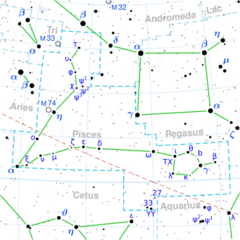Astronomy:30 Piscium
| Observation data Equinox J2000.0]] (ICRS) | |
|---|---|
| Constellation | Pisces |
| Right ascension | 00h 01m 57.61523s[1] |
| Declination | −06° 00′ 50.6684″[1] |
| Apparent magnitude (V) | 4.31 – 4.41[2] |
| Characteristics | |
| Spectral type | M3 III[3] |
| B−V color index | 1.631±0.011[4] |
| Variable type | LPV,[5] LB?[2] |
| Astrometry | |
| Radial velocity (Rv) | −11.7±0.5[6] km/s |
| Proper motion (μ) | RA: +51.158[1] mas/yr Dec.: −39.551[1] mas/yr |
| Parallax (π) | 7.8859 ± 0.4358[1] mas |
| Distance | 410 ± 20 ly (127 ± 7 pc) |
| Absolute magnitude (MV) | −1.20[5] |
| Details | |
| Radius | 73.66+16.69 −6.79[1] R☉ |
| Luminosity | 1,148.5±71.1[1] L☉ |
| Surface gravity (log g) | 2[7] cgs |
| Temperature | 3,647[7] K |
| Other designations | |
| Database references | |
| SIMBAD | data |
30 Piscium (HIP 154) is a solitary[9] variable star in the zodiac constellation of Pisces. It is visible to the naked eye with an apparent visual magnitude of 4.37.[7] Its calculated mid-value of antiposed parallax shift as the Earth moves around the Sun of very roughly 7.8859 mas, makes it around 410 light years away. Its net movement in the present epoch is one of moving closer – radial velocity (speed away from our star system) is −12 km/s.[6]

This is an aging red giant star with a stellar classification of M3 III,[3] indicating it has exhausted the hydrogen at its core and evolved off the main sequence. It is a candidate long-period variable star[5] and has been given the designation YY Psc.[11] It varies in brightness between magnitudes 4.31 and 4.41 with no clear period. Possible periods of 23.1, 32.0, 53.6, and 167.8 days have been identified.[10] The star has 74 times the Sun's radius and is radiating 1,148.5[1] times the luminosity of the Sun from its enlarged photosphere at an effective temperature of 3,647 K.[7]
References
- ↑ 1.0 1.1 1.2 1.3 1.4 1.5 1.6 1.7 Brown, A. G. A. (August 2018). "Gaia Data Release 2: Summary of the contents and survey properties". Astronomy & Astrophysics 616: A1. doi:10.1051/0004-6361/201833051. Bibcode: 2018A&A...616A...1G. Gaia DR2 record for this source at VizieR.
- ↑ 2.0 2.1 Samus, N. N. et al. (2009). "VizieR Online Data Catalog: General Catalogue of Variable Stars (Samus+ 2007-2013)". VizieR On-line Data Catalog: B/GCVS. Originally Published in: 2009yCat....102025S 1. Bibcode: 2009yCat....102025S.
- ↑ 3.0 3.1 Keenan, P.; McNeil, R. (October 1989), "The Perkins catalog of revised MK types for the cooler stars", Astrophysical Journal Supplement Series 71: 245–266, doi:10.1086/191373, Bibcode: 1989ApJS...71..245K.
- ↑ Anderson, E.; Francis, Ch. (2012), "XHIP: An extended hipparcos compilation", Astronomy Letters 38 (5): 331, doi:10.1134/S1063773712050015, Bibcode: 2012AstL...38..331A.
- ↑ 5.0 5.1 5.2 Rimoldini, L. et al. (December 2012), "Automated classification of Hipparcos unsolved variables", Monthly Notices of the Royal Astronomical Society 427 (4): 2917–2937, doi:10.1111/j.1365-2966.2012.21752.x, Bibcode: 2012MNRAS.427.2917R.
- ↑ 6.0 6.1 de Bruijne, J. H. J.; Eilers, A.-C. (October 2012), "Radial velocities for the HIPPARCOS-Gaia Hundred-Thousand-Proper-Motion project", Astronomy & Astrophysics 546: 14, doi:10.1051/0004-6361/201219219, A61, Bibcode: 2012A&A...546A..61D.
- ↑ 7.0 7.1 7.2 7.3 Pérez Martínez, M. I. et al. (November 2014), "The non-active stellar chromosphere: Ca II basal flux", Monthly Notices of the Royal Astronomical Society 445 (1): 270–279, doi:10.1093/mnras/stu1706, Bibcode: 2014MNRAS.445..270P.
- ↑ "30 Psc". SIMBAD. Centre de données astronomiques de Strasbourg. http://simbad.u-strasbg.fr/simbad/sim-basic?Ident=30+Psc.
- ↑ Eggleton, P. P.; Tokovinin, A. A. (September 2008), "A catalogue of multiplicity among bright stellar systems", Monthly Notices of the Royal Astronomical Society 389 (2): 869–879, doi:10.1111/j.1365-2966.2008.13596.x, Bibcode: 2008MNRAS.389..869E.
- ↑ 10.0 10.1 Tabur, V; Bedding, T. R; Kiss, L. L; Moon, T. T; Szeidl, B; Kjeldsen, H (2009). "Long-term photometry and periods for 261 nearby pulsating M giants". Monthly Notices of the Royal Astronomical Society 400 (4): 1945. doi:10.1111/j.1365-2966.2009.15588.x. Bibcode: 2009MNRAS.400.1945T.
- ↑ Kukarkin, B. V. et al. (January 1975), "60th Name-List of Variable Stars", Information Bulletin on Variable Stars 961: 1, Bibcode: 1975IBVS..961....1K.
 |


